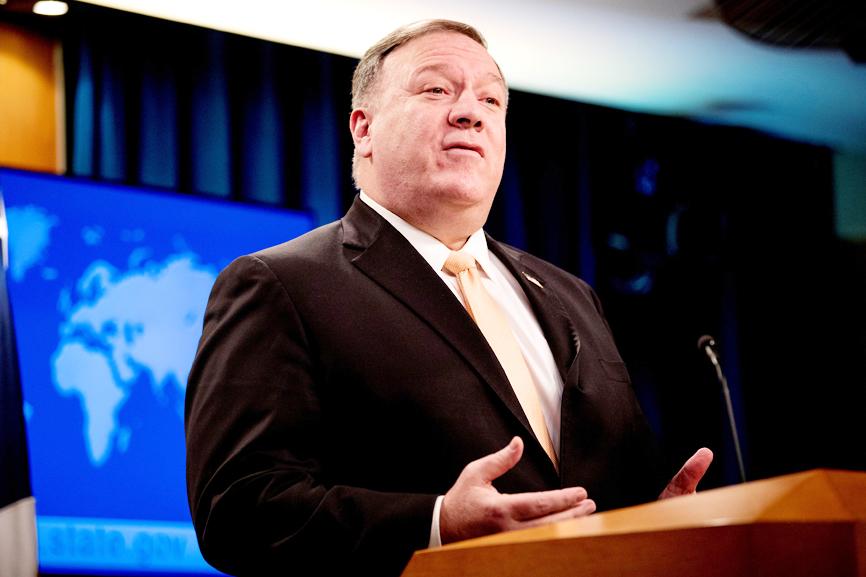The US on Tuesday offered a path for the Venezuelan government to remove sanctions in the face of a mounting humanitarian crisis by accepting a transitional government that excludes US ally Venezuelan National Assembly President Juan Guaido.
The tactical shift came after more than a year of faltering US-led efforts to oust Venezuelan President Nicolas Maduro and as fears grow that the COVID-19 pandemic could spread rapidly both inside and from the poverty-stricken nation.
US Secretary of State Mike Pompeo said that Guaido, as well as Maduro, should step aside for a transitional government comprising members of both their parties that would arrange elections in six to 12 months.

Photo: Reuters
If fully implemented, the US and EU would lift sanctions, including sweeping US restrictions on Venezuela’s key export of oil, the US Department of State said.
The IMF and other international lenders would be invited to plan economic relief for Venezuela, from which millions have fled as they face dire shortages of food and other necessities.
The plan also calls for the departure of foreign forces from Venezuela, a reference to the government’s support from Russia and Cuba.
“We believe this framework protects the interests and equities of all Venezuelan people who desperately seek a resolution to their dire political, economic and humanitarian crisis, and who know Venezuelans can have something better,” Pompeo said, urging all sides to consider it “carefully and seriously.”
Maduro has repeatedly ruled out ceding power and his government quickly rejected the framework, which is similar to a proposal put forward last year by Guaido in failed Norwegian-brokered talks.
“Venezuela is a free, sovereign, independent and democratic nation that does not and shall never accept instructions from any foreign government,” Venezuelan Minister of Foreign Affairs Jorge Arreaza said.
US Special Representative for Venezuela Elliott Abrams downplayed the reaction as predictable, but said that Washington hoped to jump-start private talks within the regime and the military, which has remained loyal to Maduro.
The US has not shifted its goals, with Pompeo renewing support for Guaido — a 36-year-old engineer who has been recognized as interim president by about 60 nations since January last year — and while the framework says that any Venezuelan can run for president, Pompeo said that the US wanted Maduro out.
“We’ve made clear all along that Nicolas Maduro will never again govern Venezuela,” Pompeo told reporters.
Abrams later said that, while the US would accept any results of a free election, it did not believe Maduro could win.
“There is no possible way that Nicolas Maduro remains in power if Venezuelans get to choose their own fate and get to elect their own leaders,” Abrams said.
Asked if Guaido could run, Pompeo said: “Absolutely, yes.”
“I think he’s the most popular politician in Venezuela. I think if there were an election held today, he could do incredibly well, but more importantly we continue to support him,” he said. “When we put together this pathway to democracy, we worked closely with him.”

SECURITY: As China is ‘reshaping’ Hong Kong’s population, Taiwan must raise the eligibility threshold for applications from Hong Kongers, Chiu Chui-cheng said When Hong Kong and Macau citizens apply for residency in Taiwan, it would be under a new category that includes a “national security observation period,” Mainland Affairs Council (MAC) Minister Chiu Chui-cheng (邱垂正) said yesterday. President William Lai (賴清德) on March 13 announced 17 strategies to counter China’s aggression toward Taiwan, including incorporating national security considerations into the review process for residency applications from Hong Kong and Macau citizens. The situation in Hong Kong is constantly changing, Chiu said to media yesterday on the sidelines of the Taipei Technology Run hosted by the Taipei Neihu Technology Park Development Association. With

CARROT AND STICK: While unrelenting in its military threats, China attracted nearly 40,000 Taiwanese to over 400 business events last year Nearly 40,000 Taiwanese last year joined industry events in China, such as conferences and trade fairs, supported by the Chinese government, a study showed yesterday, as Beijing ramps up a charm offensive toward Taipei alongside military pressure. China has long taken a carrot-and-stick approach to Taiwan, threatening it with the prospect of military action while reaching out to those it believes are amenable to Beijing’s point of view. Taiwanese security officials are wary of what they see as Beijing’s influence campaigns to sway public opinion after Taipei and Beijing gradually resumed travel links halted by the COVID-19 pandemic, but the scale of

A US Marine Corps regiment equipped with Naval Strike Missiles (NSM) is set to participate in the upcoming Balikatan 25 exercise in the Luzon Strait, marking the system’s first-ever deployment in the Philippines. US and Philippine officials have separately confirmed that the Navy Marine Expeditionary Ship Interdiction System (NMESIS) — the mobile launch platform for the Naval Strike Missile — would take part in the joint exercise. The missiles are being deployed to “a strategic first island chain chokepoint” in the waters between Taiwan proper and the Philippines, US-based Naval News reported. “The Luzon Strait and Bashi Channel represent a critical access

Pope Francis is be laid to rest on Saturday after lying in state for three days in St Peter’s Basilica, where the faithful are expected to flock to pay their respects to history’s first Latin American pontiff. The cardinals met yesterday in the Vatican’s synod hall to chart the next steps before a conclave begins to choose Francis’ successor, as condolences poured in from around the world. According to current norms, the conclave must begin between May 5 and 10. The cardinals set the funeral for Saturday at 10am in St Peter’s Square, to be celebrated by the dean of the College